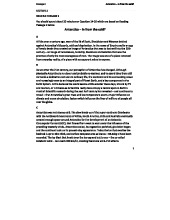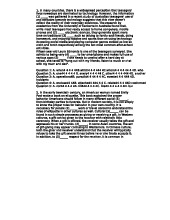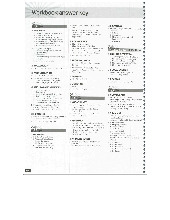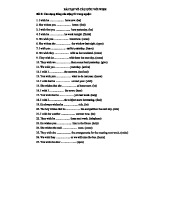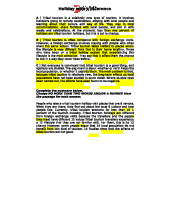





Preview text:
It’s very likely that the company wil accept his application . . 1. Giai đê
Câu hỏi: Mark the letter A, B, C, or D to indicate the sentence that is closest in
meaning to each of the fol owing questions.
It’s very likely that the company wil accept his application.
A. The company needs accept his application.
B. The company might accept his application.
C. The company must accept his application.
D. The company should accept his application. Lơi giai chi tiêt:
Kiên thức: Động từ khuyêt thiêu ở thức gia định
Giai thích: Đap an: B. The company might accept his application.
It’s likely that + S + V = S + might/may + V: suy đoan sự việc có thể xay ra
trong tương lai, mức độ chắc chắn không cao
S+ must V: suy đoan sự việc chắc chắn xay ra ở hiện tại
Tạm dịch: Rất có thể công ty sẽ chấp nhận đơn đăng ký của anh ấy.
A. Công ty cần chấp nhận đơn của anh ấy.
B. Công ty có thể chấp nhận đơn của anh ấy.
C. Công ty phai chấp nhận đơn của anh ta.
D. Công ty nên chấp nhận đơn của anh ấy.
2. Bai tâp luyên tâp liên quan
Question 1: . People have discovered a new source of energy. .
A. A new source of energy has discovered.
B. A new source of energy was discovered.
C. A new source of energy have been discovered
D. A new source of energy has been discovered Đap an: D
Giai thích: : Câu chủ động => bị động thơi hiện tại hoàn thành với chủ ngữ số ít
Question 2: . People say that he was born in London.
A. That is said he was born in London.
B. It was said that he was born in London.
C. He was said to be born in London.
D. He is said to have been born in London. Đap an: D
Giai thích : : câu bị động kép chuyển đổi từ cấu trúc:
People + V1 + that + S V2 = S + be + V1-ed + to V2/ have V2-ed: ngươi ta nói
rằng.... Động từ 1, và 2 lệch thơi nên chia to have V2-ed
Question 3: We have no seats left for the concert next Sunday.
A. Al the seats for the concert next Sunday have been booked
B. Al the seats were sold for the concert next Sunday.
C. The concert next Sunday had no seats for us.
D. No seats left for us for the concert next Sunday. Đap an: A
Giai thích : : have no seats left = seats be booked: hêt vé
Question 4: She had only just begun to speak when people started interrupting.
A. She hardly had begun to speak when people started interrupting.
B. Hardly she had begun to speak when people started interrupting.
C. Hardly had she begun to speak when people started interrupting.
D. She hadn’t begun to speak when people started interrupting. Đap an: C
Giai thích : : câu đao ngữ với hardly + had + S + PII + when S + qk.
Question 5: The storm blew a lot of trees down last night.
A. A lot of trees were blown down last night by the storm.
B. A lot of trees were cut down last night
C. The storm could have blown a lot of trees down.
D. The storm was strong enough to blow down old trees. Đap an: A
Giai thích : : câu bị động thơi qua khứ đơn
Question 6: People don't use this road very often.
A. This road is not used very often
B. Not very often this road is not used
C. This road very often is not used
D. This road not very often is used Đap an: A
Giai thích : Với câu bị động trạng từ luôn đặt cuối câu
Question 7: He was very tired but he kept on working.
A. Despite very tired, he kept on working.
B. Though his tiredness, he kept on working.
C. Although he was very tired, but he kept on working.
D. He kept on working although he was very tired.
Giai thích : : mệnh đề quan hệ chỉ sự nhượng bộ: although: dù – but: nhưng.
Một câu chỉ dùng một trong 2 từ này.
Question 8: Although it rained heavily, they went on working.
A. In spite of the rain heavily, they went on working.
B. In spite of the raining heavily, they went on working.
C. Despite the heavy rain, they went on working.
D. Though the fact that it rained heavily, they went on working. Đap an: C
Giai thích : : although + mệnh đề = despite + N: mặc dù
Question 9: . Cars cause pol ution but people stil want them.
A. Because cars cause pol ution, people want them.
B. Despite the fact that cars cause pol ution, people want them.
C. Cars cause pol ution although people want them.
D. Cars cause pol ution because people stil want them. Đap an: B
Giai thích : : despite the fact that = although: mặc dù
Question 10: They have built a new hospital near the airport.
A. Near the airport a new hospital has been built.
B. A new hospital has been built near the airport by them.
C. A new hospital near the airport has been built.
D. A new hospital has been built near the airport. Đap an: D
Giai thích : : câu bị động thơi hiện tại hoàn thành
Question 11: Their complaints to the head office should be sent.
A. People should send their complaints to the head office.
B. Complaints should be sent to the head office.
C. Complaints should be sent to the head office by people.
D. Their complaints should be sent to the head office by people. Đap an: A
Giai thích : : với câu này ta chuyển ngược từ câu bị động sang chủ động. Bị
động của should V là should be PII
Question 12: They were exposed to biased information, so they didn’t know the true story.
A. If they got unbiased information, they could know the true story
B. If they had unbiased the information, they could have known the true story.
C. If they had been exposed to unbiased information, they would have known the true story.
D. If they have exposed to the unbiased information, they could have seen the true story. Đap an: C
Giai thích : Với tình huống đã cho ở thơi qua khứ, ta gia định lại bằng câu điều kiện loại 3.
Question 13: People believe that 13 is an unlucky number.
A. 13 is believed to have been an unlucky number.
B. It is believe 13 to have been an unlucky number.
C. 13 is believed to be an unlucky number.
D. It believes that 13 is an unlucky number. Đap an: C
Giai thích : . câu bị động kép với động từ tương thuật và động từ mệnh đề chính cùng thơi.
Question 14: . People said they had demolished the building.
A. The building was said to have demolished.
B. The building was said to have been demolishing.
C. The building was said to be demolished.
D. The building was said to have been demolished. Đap an: C
Giai thích : : câu bị động kép chuyển đổi từ cấu trúc:
People + V1 + that + S V2 = S + be + V1-ed + to V2/ have V2-ed: ngươi ta nói
rằng.... Hai động từ cùng thơi nên dùng dạng to V
Question 15: We arrived at the airport. We realized our passports were stil at home.
A. It was until we arrived at the airport that we realize our passports were stil at home.
B. We arrived at the airport and realized that our passports are stil at home.
C. Not until had we arrived at the airport, we realized our passports were stil at home.
D. Not until we arrived at the airport did we realize that our passports were stil at home. Đap an: D
Giai thích : đao ngữ với not until: Not until S V + trợ động từ + S + Vo.
Question 16: He was driving so fast that he could have had an accident.
A. He wasn’t driving fast enough to avoid an accident.
B. He did’t have an accident although he was driving very fast.
C. If he had been driving very fast, he would have had an accident.
D. An accident happended, and it was caused by his very fast driving. Đap an: B
Giai thích : cấu trúc could have PII: đã có thể làm gì (thực tê không làm).
Nên tai nạn là chưa xay ra và vì thê đap an đúng là B.
Question 17: I said to her “If you let your son do whatever he wants, you wil spoil him.”
A. I said if she lets her son do whatever he wants, she wil spoil him.
B. I warned her that if she let her son do whatever he wanted, she would spoil him.
C. I warned her that if she let her son do whatever she wanted, she would spoil him.
D. I told her if her son did whatever she wanted, she would spoil him. Đap an: B
Giai thích : câu gian tiêp, toàn bộ động từ đều phai lùi thơi.
Question 18: . No matter how hard Fred tried to start the car, he didn’t succeed.
A. Fried tried very hard to start the car, and succeeded.
B. Fried tried hard to start the car, and with success.
C. However hard he tried, Fried couldn’t start the car.
D. It’s hard for Fried to start the car because he never succeeded. Đap an: C
Giai thích : mệnh đề quan hệ chỉ sự nhượng bộ: no matter how + adj = however + adj: mặc dù
Question 19: I did not read his book. I did not understand what the lecturer was saying.
A. What the lecturer wrote and said was too difficult for me to understand.
B. I found it very difficult to understand what the lecturer said in his book.
C. I would have understood what the lecturer was saying if I had read his book.
D. The lecturer’s book which I had not read was difficult to understand. Đap an: C
Giai thích : Tình huống đã cho ở qua khứ nên ta gia định ngược lại bằng câu điều kiện loại 3.
Question 20: . When I had finished the report, I went out for a cup of coffee.
A. Finishing the report, I went out for a cup of coffee.
B. Having finished the report, i went out for a cup of coffee.
C. Going out for a cup of coffee, I finished my report.
D. To finish the report, I went out for a cup of coffee. Đap an: B
Giai thích : danh động từ đầu câu thuộc về chủ ngữ “I” ở sau.
Document Outline
- It’s very likely that the company will accept his
- 1. Giải đề
- 2. Bài tập luyện tập liên quan
